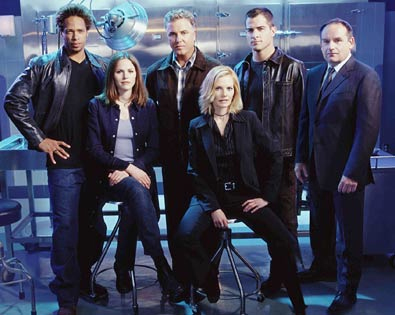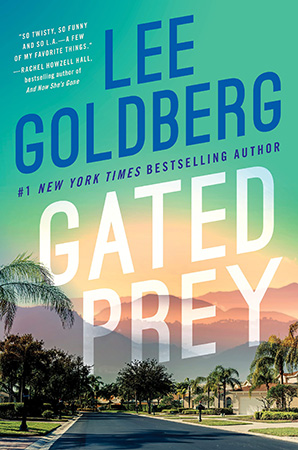A guest post from Kate Naylor.
My friend Kate loves crime shows. She’s given her passion for the genre a lot of thought, which she shares with us today. Why do you love crime and investigation TV? I’d be interested to know, so leave a comment…
Good old telly. It’s a microcosm of the world at large, covering every human foible and failing, triumph and disaster, from domestic-scale to universe-wide. But crime and investigation TV is my favourite. Here’s why.
People get so snobbish about TV. Some turn their noses up at soap operas, others get sniffy about less-than-classy B movies. You can gussy it up any way you like, and be as pretentious as you like, but at the end of the day it’s all about storytelling. Great stories, dull stories and everything in between.
 Crime stories are amongst the most popular TV shows. Take CSI, by CBS, which has run for years and years and is now at season 14. As revealed by Wikipedia, it’s incredibly popular stuff:
Crime stories are amongst the most popular TV shows. Take CSI, by CBS, which has run for years and years and is now at season 14. As revealed by Wikipedia, it’s incredibly popular stuff:
“CSI has been nominated multiple times for industry awards and has won nine awards during its history. The program has spawned several media projects including an exhibit at Chicago’s Museum of Science and Industry, a series of books, several video games, and two additional TV shows.”
Here’s what CBS says about the series:
“CSI is a fast-paced drama about a team of forensic investigators trained to solve crimes by examining the evidence. They are on the case 24/7, scouring the scene, collecting the irrefutable evidence and finding the missing pieces that will solve the mystery.”
Wikipedia also features a list of police TV dramas, with literally hundreds of entries. But why do so many millions, if not billions, of people watch it and similar series every day of the week, all over the world?
Crime investigation TV – Fulfilling an ancient need
Humankind has told stories from the beginning of time. Hundreds of thousands of years ago we huddled around campfires, safety in numbers, trying to avoid the terrifying, predatory megabeasts lurking out there in the darkness. And we still love being entertained whether it means being scared out of our wits, thrilled, perplexed, mystified, disgusted, horrified, amazed, shocked, or even offended.
That’s my number one reason for loving crime investigation TV. It’s excellent entertainment, populated with remarkable plots, scarily bizarre protagonists and eccentric criminologists. Baddies versus goodies always makes for a great tale. The less predictable the outcome, the better. And the best crime drama TV show plots are nothing if not unpredictable.
Crime TV series as workouts for the brain
Most brain training products have been thoroughly myth-busted. You can tap away on a little screen answering questions and playing games all day, but apparently it doesn’t do much good. As a report in New Scientist magazine says:
“Brain-training software may be a waste of time. People who played “mind-boosting” games made the same modest cognitive gains as those who spent a similar amount of time surfing the web.
“It didn’t really make any difference what people did,” says Adrian Owen of the MRC Cognition and Brain Sciences Unit in Cambridge, UK, who tested brain-training software on volunteers recruited through a BBC television programme.
Skills learned via the programs didn’t transfer to the cognitive tests, even when they relied on similar abilities, says Owen. For instance, people who played a game in which they had to find a match for a briefly overturned card struggled at a similar test that used stars “hidden” in boxes.
“Even when the tests were conceptually quite similar we didn’t see any improvement,” says Owen. He concludes that brain-training software only makes people better at the specific tasks they have been practising.
Torkel Klingberg, a psychologist at the Karolinska Institute in Stockholm, Sweden, agrees – to a point. “A lot of what is currently marketed as ‘brain-training’ is not created based on scientific evidence and not properly tested,” he says.”
Having said that, other reports indicate that, as a general rule, keeping your body and brain busy and entertained does seem to have physical and mental benefits. I reckon a beautifully tangled plot is just one way to keep the old grey matter moving.
Crime TV shows as vicarious adventure
If you live in the western world, life these days is pretty safe. We’re protected and policed at every turn, and we hunted the megabeasts to extinction a very long time ago. Survival isn’t so much of a struggle. We’ve evolved amazing reflexes and multiple senses designed to help us discern and avoid danger. But in everyday life, we don’t really need them any more.
Very few of us have proper adventures. Unless you happen to be an adrenaline monkey hooked on sky diving or one of those crazy people who leaps off cliffs in a bat-like flying suit, our fight or flight responses are mostly under-used. To me, crime TV shows deliver a vital taste of danger that just isn’t present in modern life. It might be a vicarious thrill. But it’s better than no thrill at all.
Crime drama TV shows reveal the human condition
 Everyone has their own sense of morality, immorality or amorality. If a psychopathic murderer turned up on our doorstep, I’d probably run screaming to the nearest cupboard and shut myself in. But we’re all different. You might grab a weapon and slot neatly into ‘kill’ mode. Someone else might collapse into a terrified jelly, unable to move. Others might ignore him, hoping he gets bored and goes away. You might try to make friends with it, more fool you. But we’re all different, and one of the greatest pleasures I get from watching crime drama TV is the insight you get into the way other people react to situations. Last time I ran away from the baddie. But next time, having seen someone in a similar situation survive, I might feel confident enough to grab an axe.
Everyone has their own sense of morality, immorality or amorality. If a psychopathic murderer turned up on our doorstep, I’d probably run screaming to the nearest cupboard and shut myself in. But we’re all different. You might grab a weapon and slot neatly into ‘kill’ mode. Someone else might collapse into a terrified jelly, unable to move. Others might ignore him, hoping he gets bored and goes away. You might try to make friends with it, more fool you. But we’re all different, and one of the greatest pleasures I get from watching crime drama TV is the insight you get into the way other people react to situations. Last time I ran away from the baddie. But next time, having seen someone in a similar situation survive, I might feel confident enough to grab an axe.
Crime investigation TV and social interactions
TV is a useful conversation point, a place you connect with your fellow humans. If you’ve ever found yourself at the water cooler, or at a party, talking about the new crime series you caught last week, you’ll know common experiences like that act as social glue. If you’re stuck for small talk, telly delivers, especially when it’s compelling enough to drive a satisfyingly interesting discussion.
Crime drama as therapy
The best crime TV shows draw you in so you’re unaware of the outside world. Your life might have either turned to shit or become magical. You might have lost your job, or be unbearably excited about a new career. You could be feeling hurt, sad, furious or furiously horny. Either way, a jolly good crime series helps you forget your current state of mind and become totally engrossed in something completely different. Therapy, if you like.
When you’re immersed in a TV crime show you love, time stands still. You’re living 100% in the present, with no pointless worrying about the past or trying to second-guess the future. Weirdly, despite the excitement, it’s an incredibly peaceful place to be. Just like a good book.
Why do you watch crime and investigation TV series?
We’re all different. Why do you watch crime drama TV? And if you don’t, why not?
 The challenge of telling two connected stories, one in the past and one in the present, is making sure the reader isn’t ahead of the characters in either time-line. Because if you fail, it will kill the suspense and the mystery. There will be no surprises. Yet, you also don’t want to withhold information from the reader, because that would be cheating. The trick is knowing when to cut away from on time-line to the other, so the reader is never quite sure how much they really know. Maintaining that delicate balancing act throughout the story is the sweet spot because, if you can pull it off, it creates a palpable tension that generates excitement… the thrill in thriller.
The challenge of telling two connected stories, one in the past and one in the present, is making sure the reader isn’t ahead of the characters in either time-line. Because if you fail, it will kill the suspense and the mystery. There will be no surprises. Yet, you also don’t want to withhold information from the reader, because that would be cheating. The trick is knowing when to cut away from on time-line to the other, so the reader is never quite sure how much they really know. Maintaining that delicate balancing act throughout the story is the sweet spot because, if you can pull it off, it creates a palpable tension that generates excitement… the thrill in thriller.

 Everyone has their own sense of morality, immorality or amorality. If a psychopathic murderer turned up on our doorstep, I’d probably run screaming to the nearest cupboard and shut myself in. But we’re all different. You might grab a weapon and slot neatly into ‘kill’ mode. Someone else might collapse into a terrified jelly, unable to move. Others might ignore him, hoping he gets bored and goes away. You might try to make friends with it, more fool you. But we’re all different, and one of the greatest pleasures I get from watching crime drama TV is the insight you get into the way other people react to situations. Last time I ran away from the baddie. But next time, having seen someone in a similar situation survive, I might feel confident enough to grab an axe.
Everyone has their own sense of morality, immorality or amorality. If a psychopathic murderer turned up on our doorstep, I’d probably run screaming to the nearest cupboard and shut myself in. But we’re all different. You might grab a weapon and slot neatly into ‘kill’ mode. Someone else might collapse into a terrified jelly, unable to move. Others might ignore him, hoping he gets bored and goes away. You might try to make friends with it, more fool you. But we’re all different, and one of the greatest pleasures I get from watching crime drama TV is the insight you get into the way other people react to situations. Last time I ran away from the baddie. But next time, having seen someone in a similar situation survive, I might feel confident enough to grab an axe.